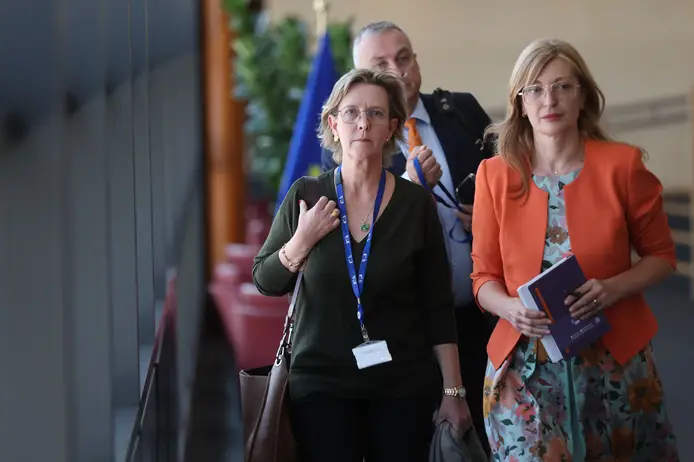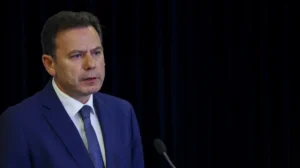European Commission wants to avoid risk of espionage – Financial Times
Portuguese European Commissioner Maria Luís Albuquerque is among colleagues given burner phones and ‘basic laptops’ for a trip to the United States. At least this is the gist of a story published in the Financial Times earlier this week, which official sources in Brussels have since sought to play down.
Information released today indicates that Maria Luís Albuquerque “will have high-level meetings with government representatives, major institutional investors, non-profit organisations, and trade associations” in Washington next week.
The former Portuguese finance minister is due to fly there on Monday, in the company of Economy Commissioner Valdis Dombrovskis and Development Aid Commissioner Jozef Síkela, and stay until the following Saturday.
The list of personalities with whom Ms Albuquerque and her colleagues will be meeting includes the governor of the People’s Bank of China, Pan Gongsheng, India’s finance minister, Nirmala Sitharaman, the chairman of the US Federal Reserve, Jay Powell, and the US Treasury Secretary, Scott Bessent – the latter to discuss financial regulation issues, says Lusa.
But the trio has not been issued with burner phones and basic laptops because of concerns that the US may infiltrate the Commission’s systems (as one source attested to the FT), more “the institution has recently updated the country-specific travel advice lists for officials”, which “reflect the latest changes in the way the Commission communicates and the general increase in global cybersecurity threats”.
“We do recommend linking the e-visa to an EU laissez-passer for senior officials to emphasise the official nature of the visit and facilitate visa processes at embassies before departure, but again, these updated recommendations have been included in many other countries’ information lists for the attention of travelling senior officials,” said the source quoted by Lusa today.
It makes perfect sense to play down the FT’s story (which suggests Ms Albuquerque et al will be “advised to turn off their devices and place them in a dedicated anti-espionage sleeve upon entering” the United States, as the European delegation is days away from setting out on the trip. Suffice it to say, the fact that the FT spoke to sources who said what they said, underscores the extent to which EU-US relations have deteriorated following Donald Trump’s return to the presidency three months ago.
No-one needs reminding that the American president has repeatedly accused the EU of being “set up to exploit the US” and imposed 20% tariffs on European exports, which he later temporarily reduced by half for 90 days.
Meanwhile, Mr Trump has adopted a pro-Russian stance, says the FT, pressured Ukraine to relinquish control of its assets by temporarily suspending military aid, and threatened to withdraw security guarantees from Europe — developments that have triggered large-scale military restructuring across the continent.
“The transatlantic alliance is over,” one of the EU officials cited in anonymity told the Financial Times, which wrote its story before talks between the EU trade commissioner Maroš Šefčovič, and US commerce security Howard Latnick reportedly “broke down”.
Thus, this is a hugely sensitive time where “both sides have reasons to spy on each other”, according to media sources picking up the FT’s story.
Today, Lusa simply extolls Maria Luís Albuquerque’s credentials, saying that “at 57, (she) is one of 11 women among 27 names (a quota of 40% for women and 60% for men)” in the second EU government of Ursula Von der Leyen, whose main mission is EU economic competitiveness. ND
Sources: LUSA/ euroactiv.com/ other sources citing the Financial Times




















